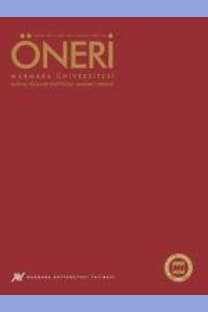ÜRÜN YAŞAM SEYRİNDE GERİ DÖNÜŞÜMÜN ÖNEMİNİN TEORİK ÇERÇEVEDE İNCELENMESİ
ÖzetTeknolojinin gelişmesi ve artan rekabet ile işletmelerin yalnızca mal veya hizmet üretmelerigünümüzde yeterli değildir. Mal ve hizmet üretimi sırasında üretim şekilleri, çevreye bakış açılarıda müşteriler tarafından izlenmektedir. Günümüzde ürünlerin ve dolayısıyla işletmelerinsürdürülebilirliğini sağlaması noktasında geri d.nüşüm ön plana çıkmıştır. Bu gerekçelerdenhareketle çalışmada ürün yaşam seyri maliyetleme yönteminde geri d.nüşümün önemi teorikçerçevede incelenmeye çalışılmıştır. Bu amaçla öncelikle temel kavramlar açıklanmış, gelenekselmaliyetleme ile ürün yaşam seyri karşılaştırılmıştır. Ardından geri d.nüşüm ve önemineyer verilerek, avantajları belirtilmiştir. Hammadde sıkıntısının yaşandığı, doğal kaynaklarıntükenme riskinin bulunduğu ve maliyetlerin yükseldiği günümüz şartlarında, işletmelerin gerid.nüşümlü ürün kullanmaları yalnızca işletmeye maliyetleri düşürmekle kalmayıp, müşterilerinde çevre bilinciyle geri d.nüşümlü ürünlere yönelmeleri sonucunda ürün satışlarının vepazar payının artmasına, işletmelerin rekabet edilebilirliğinin yükselmesine sebep olmaktadır.Çevre açısından da hava, su kirliliği azalmakta, ağaç kesimi önlenmektedir. Son yıllarda gerid.nüşüm ile yenilenebilir kaynakların oluşturulması ve sürdürülebilir üretim sağlanarak üretimsistemlerine yeni bir boyut kazandırılabilecektir.
Anahtar Kelimeler:
Ürün Yaşam Seyri; Geri Dönüşüm; Maliyetleme
EXAMINING THE THEORETICAL FRAMEWORK OF THE IMPORTANCE OF RECYCLING IN THE PRODUCT LIFE CYCLE
Abstract With the development of technology and increasing competition, producing goods or services of the business is not enough today. Production forms of business and their pers- pectives on the environment during the production of goods and services are also monitored by the clients. Today, in the matter of ensuring the sustainability of products and hence the company, recycling has come into prominence. With these grounds, in the product life cycle costing in this study, the importance of recycling have been studied in a theoretical framework. For this purpose, basic concepts are primarily explained and product life cycle is compared with traditional costing. Then, employing the importance of recycling and its advantages are described. The presence of shortages of raw materials, the risk of extinction of natural resources and in today’s world where the cost rises, using recycled products decreases operating costs and so customers turn to recycled products with the environmental awareness. Hereat, competitiveness of enterprises, their product sales and market share have increased. In terms of environment, air and water pollution decrease and logging is prevented. During recent years, the creation of renewable resources by recycling will ensure sustainable production and bring a new dimension to the production systems.
Keywords:
Product Life Cycle; Recycling; Costing,
- ISSN: 1300-0845
- Yayın Aralığı: Yılda 2 Sayı
- Başlangıç: 1994
- Yayıncı: Marmara Üniversitesi
Sayıdaki Diğer Makaleler
DÂHİLDE İŞLEME REJİMİ KAPSAMINDA GERÇEKLEŞEN İŞLEMLERİN MUHASEBELEŞTİRİLMESİ
ÜRÜN YAŞAM SEYRİNDE GERİ DÖNÜŞÜMÜN ÖNEMİNİN TEORİK ÇERÇEVEDE İNCELENMESİ
TÜRKİYE’DE SAĞLIK SEKTÖRÜNDE İNSAN KAYNAKLARI SİSTEMİNİN İNCELEMESİ
MİSYON İFADELERİ ÜZERİNDEN PAZARLAMA FELSEFELERİNİN KEŞFEDİLMESİ: CAPITAL 500 ÜZERİNE BİR ARAŞTIRMA
TÜRK GİYİM SEKTÖRÜNDE YENİ BİR E-TİCARET MODELİ: ÖZEL ALIŞVERİŞ SİTELERİ
Beril DURMUŞ, Yusuf ERDEM, Dilek SAĞLIK ÖZÇAM, Serkan AKGÜN
YALIN DÜŞÜNCE UYGULAMASI: HASTANELERDE DEĞER KATMAYAN FAALİYETLERİN ORTADAN KALDIRILMASI
REKLAMLARDA ÜNLÜ KULLANIMINDA CİNSİYETİN MARKA İMAJI ÜZERİNDEKİ ETKİSİ
